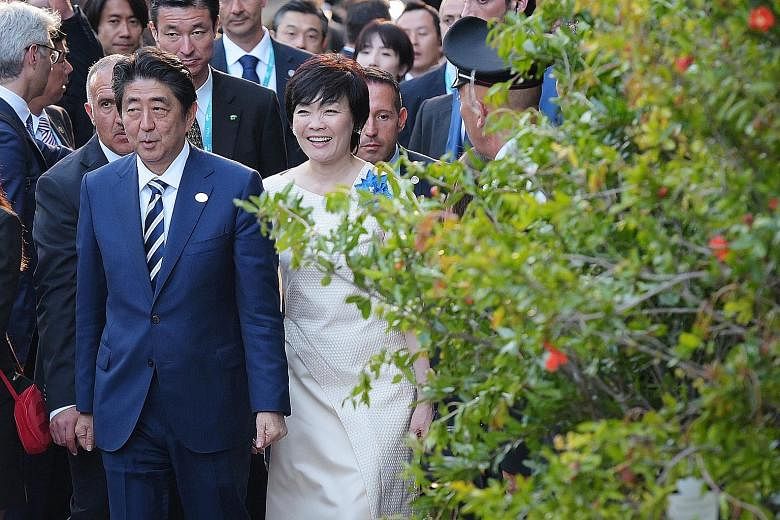TOKYO • Japanese Prime Minister Shinzo Abe's wife Akie is a freewheeling, flamenco-dancing socialite who once described herself as the "opposition" to her husband and is now embroiled in a scandal that threatens his career.
The 55-year-old has been thrust into the spotlight amid a cronyism and cover-up affair that has battered the Premier's popularity.
Japan's emboldened opposition parties have called for Mrs Abe to appear in Parliament to explain her links to a nationalist school operator at the centre of the cronyism scandal. The operator, who at one point named her the honorary principal of his new school, snapped up state-owned land at a price well below market value, with the opposition claiming his ties to the Abe family helped grease the deal. The scandal flared further when it emerged that Finance Ministry documents regarding sale had been altered, including deleting her name.
The attention is probably not what Mrs Abe expected when she vowed to raise the profile of the Prime Minister's wife following a series of predecessors who shunned the limelight.
As Mr Abe fends off political pressure to resign, his wife's Facebook page has not been updated since March 11. Her social media activity once landed her in hot water when she stunned followers by posting an image of a shirtless man with the word "Akie" and an arrow mark written on his chest.
Politically speaking, Mr Abe benefits from a relatively weak opposition. But this is apparently not the case at home, with Mrs Abe once describing herself as the "opposition camp in the family".
She has frequently acted in opposition to her husband's policies, openly supporting an anti-nuclear campaign as the government bids to get reactors back in operation following years of shutdown due to the 2011 Fukushima nuclear crisis.
She has visited Tokyo's Yasukuni Shrine, which honours millions of Japan's war dead as well as several senior figures convicted of war crimes after World War II.
Her husband has been forced to stay away from the shrine after running into fierce criticism from war-time adversaries China and South Korea after visiting it in 2013.
In 2016, she also made a controversial visit to Pearl Harbour, bombed by Japanese planes in an attack that brought the United States into World War II, months before her husband made a historic visit with then President Barack Obama.
When Mr Abe first took office in 2006, his wife was seen as a political asset, helping to soften his hawkish image.
But some pundits have now labelled her "Abenorisk" - a pun on "Abenomics", her husband's economic policy - as the scandal dents Mr Abe's hopes of winning re-election as head of his ruling party in September. "At first, her liberal image was expected to help balance Abe's conservatism, but she was too freewheeling," said Professor Tomoaki Iwai, who specialises in Japanese politics at Nihon University.
"She has little awareness of the political significance of her position, while Prime Minister Abe appears to have lost control of her," Prof Iwai told Agence France-Presse.
"In total her presence is negative to the administration," he added.
Born Akie Matsuzaki, her father was president of Morinaga and Co, one of Japan's best known confectionery companies. She studied at a Roman Catholic school and worked for Japan's leading advertising firm Dentsu before meeting Mr Abe and marrying him in 1987. The couple have no children.
Mrs Abe has professed a love for South Korean culture and is known to be a fan of the neighbouring country's heart-throb Bae Yong Jun, a baby-faced soap opera star.
While Mr Abe is teetotal, Mrs Abe is known to enjoy an occasional drink. In 2012, she opened a Japanese-style pub serving organic vegetables. She also studies flamenco dancing, a talent she has shown off for the cameras.
On March 17, she attended a social event as a guest speaker, reportedly telling the audience: "Sometimes I regret my past but I want to value present time without worrying or fearing what will happen."
AGENCE FRANCE-PRESSE, YOMIURI SHIMBUN/ASIA NEWS NETWORK

